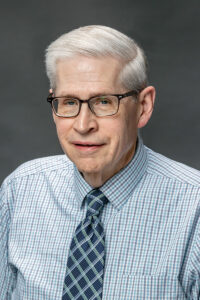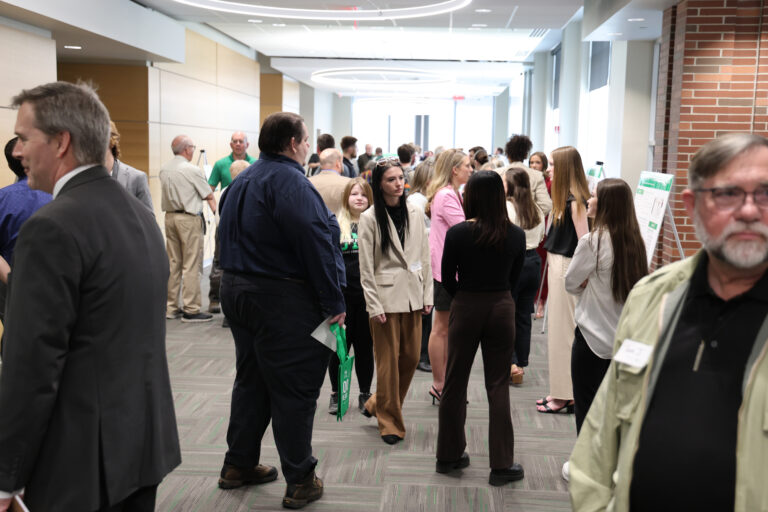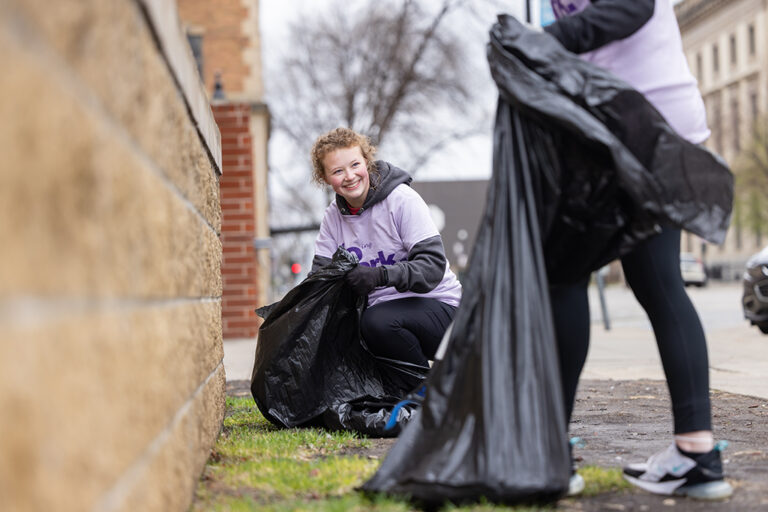Calling all students
UND reaches out to more than 9,700 students and prospective students during COVID-19 pandemic

How are you?
Is there anything we can do to help?
Do you have any questions?
From the end of March until mid-May, these three questions were posed to more than 9,700 University of North Dakota students and prospective students during the COVID-19 pandemic. Fifty staff volunteers took on the herculean task of contacting the students individually by phone, email and voicemail in an effort help them cope not only with the transition to online education, but also with disruptions, uncertainty and unplanned problems caused by the coronavirus outbreak.

The effort went far beyond simply calling students to find out how they were doing. If the callers couldn’t answer a question or deal with a certain issue, they made sure each student was put in contact with someone at UND who could provide an answer. Questions about housing, grades, finances, courses, flight training and technical issues were recorded and referred to faculty and staff with expertise in those areas.
“There were people who truly had needs,” said Charles (Chuck) Crummy, training manager of Dining Support Services, who retires today from UND. “I talked to a student who didn’t have any food. That was shocking. We got him in contact with the UND Alumni Association’s Angel Fund and provided him some other options. I followed up personally with him a couple times to make sure he was okay. When you can make a difference, it’s a big deal.”

Cara Halgren, vice president for Student Affairs & Diversity and Dean of Students, said what initially appeared as a job too large to tackle came to symbolize what UND is about and how the University values its students.
“UND really does care about its students,” she noted. “It’s a value deeply held and has been for a long time. We are continuing what’s already been in place because it’s a part of who we are. While this feels like a relatively new kind of project or an approach to connecting with students, it truly is a different mode of helping students understand the core values of the institution.”

Debbie Storrs, interim Provost and Vice President for Academic Affairs, said the partnership formed between her office and Student Affairs is working to make sure students’ problems and concerns are being addressed during these challenging times. As a result of the calling campaign, Student Affairs sent 120 students to get help from academic advisors.
“Student Affairs at first does a general contact asking how everything’s going and whether there are any issues,” Storrs explained. “If students say they’re having academic issues, that’s when the transition happens for the handoff to Academic Affairs. It’s been a great partnership.”
Tripling the outreach effort
What began as an outreach to a few thousand UND students living in residence halls during the pandemic turned into a massive program to contact more than 7,000 additional students.
“It started from a conversation we had with Cara’s team about how the COVID-19 transitions would likely cause a lot of stress in our students’ lives,” said Alex Pokornowski, assistant dean of students and director of the Office of Student Rights & Responsibilities. “We thought they might benefit from someone reaching out and saying, ‘Hey, how you doing? Is there anything we can do to help?’
“We initially targeted the students living in the residence halls,” he continued. “We wanted to start with them because of all the changes that occurred when UND went to remote classes. We had a general sense these students would benefit, and so we started reaching out to them.”

After contacting about 2,000 students over a five-day period, the effort was greatly expanded to include all undergraduates, prospective students and nondegree-seeking students.
“We found a lot of students asking questions or having concerns about things that didn’t have anything to do with housing or with COVID-19, but with transitions or other things they’re doing with UND,” Pokornowski said.
The reaction from students in the residence halls was so positive and the need for more outreach so obvious that the decision was made to increase the scope of the program. It seemed an insurmountable, but necessary, task for the University.
Breaking it down

“How do you eat an elephant? One bite at a time,” Pokornowski laughed. “That’s how we approached it. There were probably 15 different departments that participated in the follow-up. We broke it up and gave the staff members making the calls smaller chunks of the list to make it more manageable.”
As expected, some students didn’t answer phone calls from numbers they didn’t recognize, but Crummy was astounded at how many did.
“I get so many robo-calls on my phone that when I see a phone number I don’t know, I say, ‘Yeah, I’m not picking that up!’ But a lot of students answered my calls, which really surprised me.”
Students who weren’t contacted by phone were left voicemails or received emails. Many expressed appreciation that UND was making the effort to reach out to them during the pandemic to address their concerns.
“One aspect of this was that people would return calls, call again and email again because they suddenly had a person who could help them with their problems,” said Derek Sporbert, TRIO Programs director. “It didn’t matter if it was an academic question or a question about a bill. There was a person they knew who could help find answers, and it made them feel better.”
‘This is amazing!’

Sporbert recalled his conversation with a distance education student in Texas who had never been near the UND campus. “She laughed and said, ‘This is amazing!’ I want to come visit Grand Forks if this how they treat people,’” he related.
As one of UND’s 50 volunteer callers, Sporbert looked forward to his daily interactions with students.
“It was kind of a nice break when you’re working remotely, you’re sitting at your desk and you’re on your fifth Zoom meeting of the day,” he said. “It was good to get away from the computer, pick up the phone, call students to see how they were doing and have conversations about any issues they’re having.”

Kristi Okerlund, director of Student Involvement & Parent Programs, received an email from a student she’d called who thanked her and said, “To be completely honest, I had never expected a nice call amidst apartment isolation from a UND professional, especially yourself.”
Okerlund said most students she spoke with were pleasantly surprised when someone from UND called to find out how they were coping with the coronavirus pandemic.
“We recognized that a lot had changed over the six weeks, and a lot of students were very eager to share,” she said. “Overall, the calls were very well received, and students were very grateful to know that we were calling to check on them. The reassurance we are all still working and here to help support students in any way we can was an important aspect of making these calls.”
Students not just a number
As a nurse practitioner with Student Health Services, Sarah Gustafson is accustomed to assisting UND students on a daily basis, but she found making calls to them especially rewarding.
“Students felt they weren’t just a number,” she said. “They were a person that UND – as a community – cares about. We wanted to help with any resources we could provide.
“This has helped our UND team recognize the skills across the University and how we can better work together,” she added. “And for our students, it was just that extra step of showing the uniqueness of UND.”

Academic core advisor Shannon Sporbert Webber said teamwork helped streamline the process of getting students’ issues resolved in a timely manner.
“Sometimes it’s things students know, but they need a bit of reassurance, a little lift, to work through things and get them done,” she noted. “Sometimes the issues are more complicated, and that’s where we, as advisors, get involved. We can coordinate with multiple people in different offices so that students don’t have to jump through hoops and tell their stories over and over again. We provide guidance and make connections across campus to help student get their questions answered.”
Sharing information across campus
Before UND transitioned to remote education in mid-March as a result of the COVID-19 outbreak, Student Affairs and the Office of Academic Affairs created a student support team to address a range of issues and problems with which students might have to deal.

“That group looked specifically at students in which multiple concerns had been brought up in different areas,” said Karyn Plumm, vice provost for Student Success. “We’re now doing a better job of proactively reaching out to students before the concerns get to a point where we have a hard time keeping them on track.
“We’ve learned that it doesn’t matter where the information is coming from, but we need to share it more widely,” she added. “Students want to hear from someone. It doesn’t necessarily matter who it is as long as we get them connected with the right person who can help answer their questions.”
Halgren said when she visits with UND alumni, they often speak fondly of their experiences outside the classroom and their connections with people at the University. Calling to check in with thousands of UND students during the coronavirus pandemic is something she believes future alumni will remember.
“To me, this is about continuing to identify who we are as an institution,” she said. “This is who we are as colleagues across the campus. It shows we really do care. Regardless of the circumstances, you’re going to see this from us. We show up. We want students to know that we’re there for them. This is a very specialized way of doing it. It’s a reflection of who we’ve always been.”



